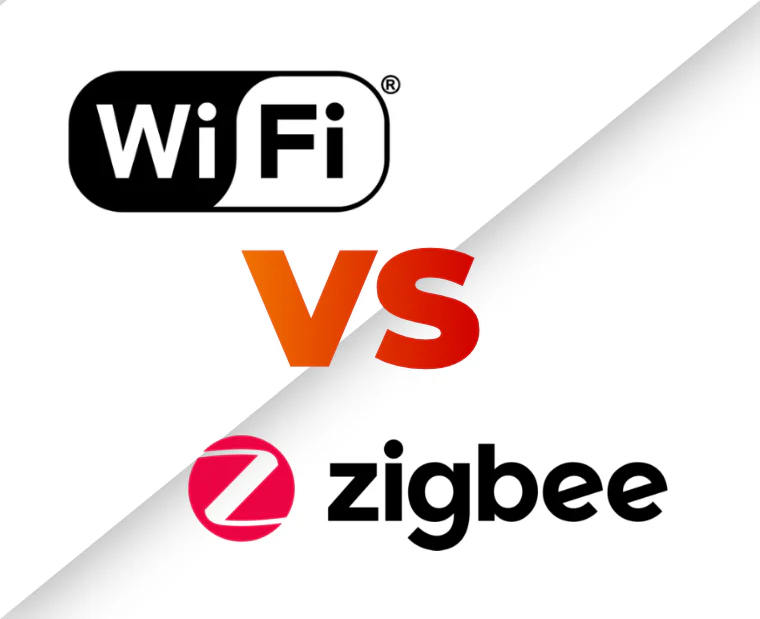Zigbee vs WiFi
Which is Better for Smart Home Automation?
When it comes to Smart Home Automation, choosing the right wireless communication protocol is crucial. Both Zigbee and Wi-Fi offer unique advantages and disadvantages, and the best choice depends on your specific needs. In this blog, we’ll explore the strengths and weaknesses of each to help you make an informed decision for your smart home setup.
Understanding Zigbee and Wi-Fi
Zigbee is a wireless protocol designed for low-power, low-data-rate applications, such as home automation and sensor networks. Its energy efficiency and ability to create a reliable mesh network make it ideal for battery-powered devices that need to communicate over long distances.
Wi-Fi, on the other hand, is the go-to protocol for high-speed data transfer and internet connectivity. It supports a wide range of devices, from smart TVs to security cameras, making it a versatile choice for smart homes that require high-bandwidth applications.
Range and Coverage
Zigbee Range: Zigbee networks can cover around 10 to 100 meters, depending on the environment. Its mesh networking capability allows for extended coverage, as each device can relay signals to another.
Wi-Fi Range: Wi-Fi networks typically offer a range of up to 300 meters in ideal conditions. However, obstacles like walls and floors can reduce signal strength, and additional devices like extenders may be required to maintain consistent coverage in larger homes.
Power Consumption
Zigbee: Zigbee’s low power consumption makes it ideal for battery-operated devices, which can operate for months or even years on a single battery.
Wi-Fi: While more power-hungry, Wi-Fi’s higher data transfer rates are essential for devices that require constant, high-speed internet connections, such as smart cameras and video doorbells.
Zigbee vs WiFi: which is Better for Your Smart Home?
Both Zigbee and Wi-Fi have their own advantages and disadvantages, and which one is better depends on the specific use case and requirements.
Zigbee
- ✅ Zigbee is perfect for low-power, low-data-rate applications where battery life and range are essential.
- ✅ Zigbee devices can form a mesh network, maintaining functionality even if one device fails.
- ❌ However, Zigbee networks can be more complex to set up than Wi-Fi networks, and interference from other devices can affect range.
Wi-Fi
- ✅ Wi-Fi supports high-speed data transfer and is ideal for internet access, media streaming, and other high-bandwidth applications.
- ✅ Wi-Fi networks are easy to set up and compatible with a wide range of devices.
- ❌ However, Wi-Fi devices typically consume more power, and their range is limited to a few hundred feet.
When deciding which protocol is best for your Smart Home, consider the size of your home and the number of devices you need to connect. Zigbee is ideal for smaller homes or specific low-power applications (sensors), while Wi-Fi excels in larger spaces requiring high-bandwidth connectivity. Zigbee may require additional hardware for extended ranges, and Wi-Fi may require access points to extend range.
Ultimately, the best protocol depends on your individual needs and budget. By carefully weighing the pros and cons of Zigbee and Wi-Fi, you can choose the one that best meets your smart home needs.
Conclusion
At CogCons, we specialize in Smart Home Solutions that integrate seamlessly with both Zigbee and Wi-Fi. Whether you’re starting fresh or enhancing an existing system, our products are designed to offer the best of both worlds. Explore our range of smart home devices today and take the next step in your home automation journey!
CogCons Smart Home Consultant can help you choose the right option for your Dream Home.
Get Free Expert Advice NowOther Related Posts
Get Your Estimate
Visit Experience Center
Bengaluru
HSR Layout
3rd Floor, 1, 20th Main Rd, Agara Village, 1st Sector, HSR Layout, Bengaluru, Karnataka, 560102.






